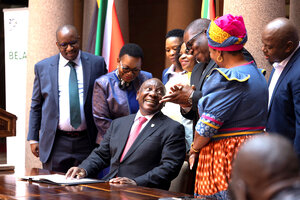Humble pivots to a political center
In three democracies, opponents are trying to forge alliances. In one, civility and respect are winning.

South Africa's President Cyril Ramaphosa talks with other political leaders after signing an education bill in Pretoria on Sept. 13.
Reuters
More than two months after French voters left Parliament without a ruling party, their country has a mounting debt crisis and no one in charge to solve it. It has fallen to Michel Barnier, a moderate conservative newly appointed as prime minister, to cobble France’s headbutting political factions into a governing coalition.
In a year when more than 60 nations are holding elections, Mr. Barnier can draw fresh lessons from other places where voters have forced political rivals to share power. One insight that has emerged from ballots already held is that the most effective governing partnerships may be those that bridge the widest divides.
Take South Africa, for instance. In May, voters ended three decades of one-party rule under the African National Congress (ANC). The party faced a decision: Team up with smaller factions that might have drawn it further leftward, or turn to a rival with whom it shared a history of ideological differences.
Choosing the latter has paid dividends. “The mood is better, the scope for doing things is better, the capital markets are favourable,” Andrew Donaldson, a former National Treasury official, told The Brenthurst Foundation last week. An assessment by the International Monetary Fund this month noted signs of new economic stability and resilience.
Debate over a new education bill illustrates what that optimism rests on. The ANC and its main coalition partner, the Democratic Alliance, are deeply divided over a provision in the bill that would allow the national government to override regional decisions about what language schools use for instruction. South Africa has 11 official languages. Minority groups worry about retaining cultural autonomy.
The debate remains unresolved, but it has not broken a shared commitment to civility and accommodation between the rivals-turned-partners. President Cyril Ramaphosa, of the ANC, told Parliament last week, “I don’t work on the basis that we are going to differ to a point of even parting ways. I have often worked on the basis ... that for every problem there is a solution.”
Mr. Ramaphosa has delayed implementing the legislation to try to soften the impasse. That gained his governing partner’s appreciation. “It is of critical importance to understand that conflict over policy in a multi-party government ... is normal and indeed necessary in a democracy,” Democratic Alliance leader John Steenhuisen told business leaders in Cape Town last week.
Shared governance fosters a willingness of rivals to see the good in each other; its moderating effect ripples outward. In India, for example, observers credit a new period of coalition government brought on by elections this spring for softening the hard-line Hindu nationalist policies of Prime Minister Narendra Modi.
In France, as The Atlantic once noted, the expression en même temps (often translated as “on the other hand”) suggests “either a willingness to listen and reflect, or an unwillingness to choose.” As he builds a coalition to govern, Prime Minister Barnier may follow the wisdom of the former. “Every citizen is necessary,” he insisted recently. He may already be listening to the lessons of civility and respect now emerging from South Africa and elsewhere.

